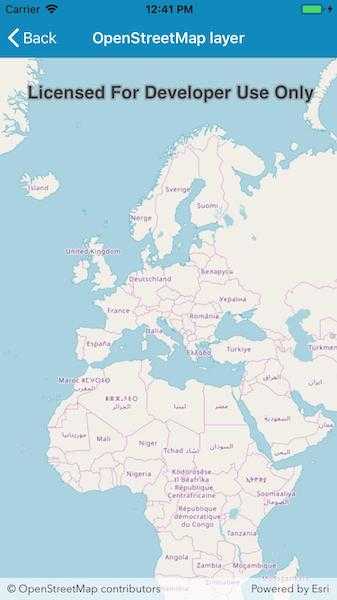Add OpenStreetMap as a basemap layer.

Use case
OpenStreetMap is a free community-edited basemap.
How to use the sample
When the sample opens, it will automatically display the map with the OpenStreetMap basemap. Pan and zoom to observe the basemap.
How it works
- Create a basemap wwith a
BasemapStyle.OSMStandardbasemap style. - Create a map with that basemap.
- Show the map in a map view.
Relevant API
- Basemap
- Basemap.CreateOpenStreetMap
- Map
- MapView
- OpenStreetMapLayer
Additional information
The attribution text will be set to the required OpenStreetMap attribution automatically.
Apps that expect to make many requests to OpenStreetMap should consider using an alternative tile server via the WebTiledLayer class.
Esri now hosts an OpenStreetMap vector layer on ArcGIS Online that uses recent OpenStreetMap data in conjunction with a style matching the default OpenStreetMap style. This layer is not subject to the tile access restrictions that apply to tiles fetched from OpenStreetMap.org.
Tags
basemap, layers, map, open, OpenStreetMap, OSM, street
Sample Code
// Copyright 2019 Esri.
//
// Licensed under the Apache License, Version 2.0 (the "License"); you may not use this file except in compliance with the License.
// You may obtain a copy of the License at: http://www.apache.org/licenses/LICENSE-2.0
//
// Unless required by applicable law or agreed to in writing, software distributed under the License is distributed on an
// "AS IS" BASIS, WITHOUT WARRANTIES OR CONDITIONS OF ANY KIND, either express or implied. See the License for the specific
// language governing permissions and limitations under the License.
using ArcGISRuntime;
using Esri.ArcGISRuntime.Mapping;
using Esri.ArcGISRuntime.UI.Controls;
using Foundation;
using UIKit;
namespace ArcGISRuntimeXamarin.Samples.OpenStreetMapLayer
{
[Register("OpenStreetMapLayer")]
[ArcGISRuntime.Samples.Shared.Attributes.Sample(
name: "OpenStreetMap layer",
category: "Layers",
description: "Add OpenStreetMap as a basemap layer.",
instructions: "When the sample opens, it will automatically display the map with the OpenStreetMap basemap. Pan and zoom to observe the basemap.",
tags: new[] { "OSM", "OpenStreetMap", "basemap", "layers", "map", "open", "street" })]
public class OpenStreetMapLayer : UIViewController
{
// Hold references to UI controls.
private MapView _myMapView;
public OpenStreetMapLayer()
{
Title = "OpenStreetMap layer";
}
private void Initialize()
{
// Create the OpenStreetMap basemap.
Basemap osmBasemap = new Basemap(BasemapStyle.OSMStandard);
// Create the map with the OpenStreetMap basemap.
Map osmMap = new Map(osmBasemap);
// Show the map in the view.
_myMapView.Map = osmMap;
}
public override void LoadView()
{
// Create the views.
View = new UIView() { BackgroundColor = ApplicationTheme.BackgroundColor };
_myMapView = new MapView();
_myMapView.TranslatesAutoresizingMaskIntoConstraints = false;
// Add the views.
View.AddSubviews(_myMapView);
// Lay out the views.
NSLayoutConstraint.ActivateConstraints(new[]
{
_myMapView.TopAnchor.ConstraintEqualTo(View.SafeAreaLayoutGuide.TopAnchor),
_myMapView.BottomAnchor.ConstraintEqualTo(View.BottomAnchor),
_myMapView.LeadingAnchor.ConstraintEqualTo(View.LeadingAnchor),
_myMapView.TrailingAnchor.ConstraintEqualTo(View.TrailingAnchor)
});
}
public override void ViewDidLoad()
{
base.ViewDidLoad();
Initialize();
}
}
}